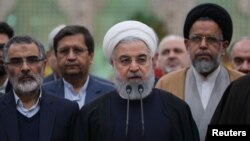Britain, France and Germany are launching a mechanism Thursday to ease non-dollar business deals with Iran, an effort aimed at circumventing U.S. trade sanctions against Tehran after President Donald Trump withdrew from the 2015 international pact to curtail Iran's nuclear weapons program.
The entity is registered in France with German governance and funding from all three countries. It will allow European Union companies to trade with Iran despite Washington's sanctions.
U.S. officials said they were monitoring the development, but rejected the idea that the special payment mechanism would undercut U.S. efforts to use the sanctions to undermine Tehran's economy.
A spokesman for the U.S. embassy in Germany said Trump "has made clear entities that continue to engage in sanctionable activity involving Iran risk severe consequences that could include losing access to the U.S. financial system and the ability to do business with the United States or U.S. companies."
The finance mechanism, called INSTEX - short for Instrument in Support of Trade Exchanges - has the support of all 28 EU members.
EU foreign policy chief Federica Mogherini said, "This step... the establishment of the special purpose vehicle, is I believe the mechanism that will allow legitimate trade with Iran to continue as foreseen in the nuclear agreement. So full support from our side."
The European announcement comes as Trump on Wednesday assailed U.S. intelligence chiefs for what he says is their "extremely passive and naive" views of Iran's nuclear ambitions.
Central Intelligence Agency Director Gina Haspel told a congressional panel this week that Iran was “technically” in compliance with the 2015 deal between it and world powers to curtail its nuclear weapons development and at least a year away from developing such a weapon.
Trump said, “Perhaps Intelligence should go back to school!”
Haspel's conclusion is in line with the United Nations atomic watchdog agency, which 13 times has certified Iran's compliance with its obligations.
On Thursday, Trump attacked Senate Democratic leader Chuck Schumer, saying he and other Democrats "are big fans of being weak and passive with Iran. They have no clue as to the danger they would be inflicting on our Country. Iran is in financial chaos now because of the sanctions and Iran Deal termination. Dems put us in a bad place - but now good!"
The effect of the European financing mechanism to bypass U.S. sanctions is uncertain.
Iranian Deputy Foreign Minister Abbas Araqchi told state television, "It is a first step taken by the European side ... We hope it will cover all goods and items."
Some diplomats, however, said the trade mechanism might not cover the biggest commercial transactions Tehran wants.
Germany's BDI industry group said, "Central questions ... are still open. The clearing office is still reliant on sanctioned Iranian oil and gas business, so that substantial risks remain for a longer-term trade relations."





